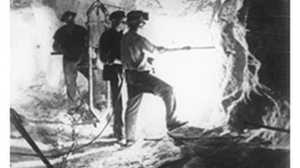Kristallnacht, Germany's "Night of Broken Glass"

On October 28, 1938, 17,000 Jews of Polish citizenship, many of whom had been living in Germany for decades, were arrested and interned in "relocation camps." When 17-year-old Herschel Grynszpan, then a student in Paris, received news of his family's expulsion, he went to the German embassy and shot Third Secretary Ernst vom Rath, who died two days later. When arrested by the French police, Grynszpan, hoping his actions would alert the world to the plight of the Jews in Europe, said, "Being a Jew is not a crime. I am not a dog. I have a right to live and the Jewish people have a right to exist on earth."
Assault on Jews
The assassination provided Adolf Hitler with the excuse he needed to launch a pogrom against German Jews. It would become known as Kristallnacht, "the night of broken glass." His deputy Joseph Goebbels orchestrated the violence across Germany. On the night of November 9, 1938, rampaging mobs attacked Jews in the street, in their homes, and at their places of work and worship. Nazi storm troopers allowed the destruction and arrested as many Jews as the jails could hold. Broken glass littered the streets in front of burning synagogues. By the end of the night, 91 Jews were dead, more than 900 synagogues were burned, nearly 7,000 Jewish businesses were destroyed, cemeteries and schools were vandalized, and 30,000 Jewish men had been deported to concentration camps. The following day Goebbels wrote in his diary: "As was to be expected, the entire nation is in uproar. This is one dead man who is costing the Jews dear. Our darling Jews will think twice in future before simply gunning down German diplomats."
Turning Point
Three days later, on November 12, the top Nazi leadership met to enact a wide-ranging set of anti-Semitic laws that segregated Jews into ghettos, placed a curfew on their activities, banned their ownership of guns, suspended their driver's licenses, and confiscated their radios. In addition, the Nazis fined German Jews one billion marks for vom Rath's assassination and for "broken windows." At the end of the meeting, Hermann Göring announced, "I have received a letter written on the Führer's orders requesting that the Jewish question be now, once and for all, coordinated and solved one way or another." Kristallnacht became a turning point in German policy, setting into motion the Nazis' systematic extermination of Jews, the Romani people, Communists, Christians, homosexuals, the mentally ill, and other Nazi enemies: the Holocaust.







